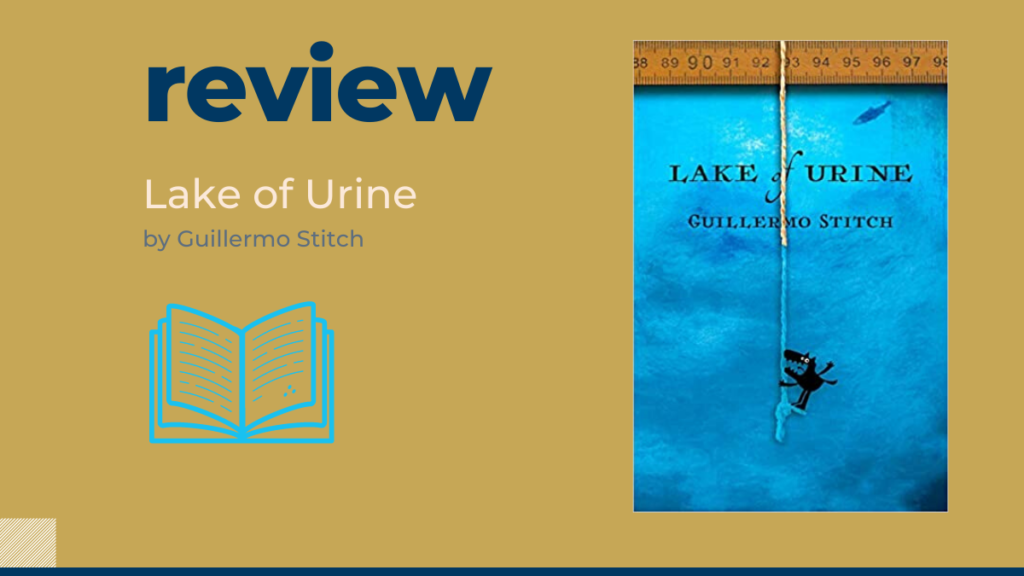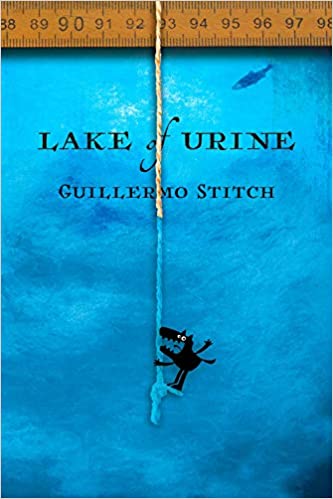
Lake of Urine
by Gullermo Stitch | Sagging Meniscus| 214pp | £12.99 pb | 9781944697945
Review by Kevin Kiely
There are responsibilities on the critic in discussing Stitch and his ‘love story’, which is light years away from romance. Heavy ironies abound, not least in the dialogue (usually) intercut with the absurd: ‘What will we call the baby, Phinoola Quigg? It’s breathing!’
The paper-thin ‘people’ show that language is central, not character: Willem Seiler, resident psycho/weirdo; Noranbole (Boley) and Urine, both Emma Wakeling’s daughters ‘of marrying age’; and Emma ‘Keeping her eye on them, and not so much on them as the lads who hovered round them like flies’. Seiler is (almost) a Thomas Harris (Silence of the Lambs) ghoul with his ‘designs’ concerning Urine, his spooky uses of string and measurements, and his misanthropic moods among ‘the local snotnoses’. Seiler is hateful towards Urine, voyeuristic towards Noranbole and, with regard to their mother, one never quite knows.
The four leading, or rather misleading, characters impinge on consciousness through the haphazard storyline. Linguistics and brittle style dominate to manufacture the comedy, such as it is. This is definitely not traditional fiction (thankfully) and Seiler quasi-narrates the opening mock-ironic cliff-hanger section (seventeen pages). One of the daughters almost drowns his mule, called Lepidopter. Otherwise, there’s a welter of very minor characters, including Mr Feuchwanger, Mr Star Blanket, Mr Amerideath, Mr Deer Spirit, Phineas Dunkhorn and Heyward Phenn.
Seiler sets up (between hints) a partly Gothic horror and partly absurd backwoods claustrophobic lifestyle, near the brash urban location called ‘Big City’—actually a cutesy leisure shopping zone where the latest by-law is Number 99, ‘MARS’, i.e. Mandatory Apparel Recycling Scheme. The terrain of the parallel ‘storyline’ is really where Stitch dishes the dirt on the theme of ‘welcome to the small town’.
Seiler ‘controls’ this short novel and weird plot. Stitch is not writing airport literary fiction with clunky research, nor any genre of bestselling fiction with ying-yang soap-opera and off-the-peg dialogue. Nor what goes for comic fiction: stand-up routines and ‘comedy’ as in Howard Jacobsen’s The Finkler Question, borrowed from Woody Allen. Stitch’s low-wattage humour strives for originality. It would be insulting to label the book ‘experimental’. You won’t actually roll on the floor laughing but there is enough to tickle you through the linguistic fare. Emma recalls her seventh husband: ‘He sent instructions a few weeks later to forward the wheelbarrow to his mountainside abode. I was only too happy to comply and sent his mother in it, though she hadn’t been mentioned in the note.’
Anne Cunningham (Irish Independent) calls Stitch’s creations ‘batshit crazies’. Indeed. Emma’s section (the longest) works best, achieving full absurdity where she parades the eight husbands (names per J.P. Dunleavy), including Sampson Jope; Paco Naranja, ‘butcher and marmalade artist’; Devyn Butters; and Klement Dobrovolny, novelist and Fellow of the National Institute of Letters. Emma says: ‘I’ll confess I’ve never really understood the need for fictional stories’. Stitch implies within the text that commercial fiction is absurd in itself. When it comes to Mr Cleverly, there is a one-sentence chapter: ‘Of Noranbole’s father, my fourth husband, I do not speak’. Another husband, Silky Lapel, who is neurotic about table manners and ‘polishing his knife’ before eating, flounces around the house, which cues a bawdy sequence. Selwyn Prentice, son of a pastor, and another pastor, Charles Wakeling, nail a brass plaque under Giorgione’s Sleeping Venus with the words ‘You Are Expected Not To Admire This’.
Seiler reappears after a novel-length absence in the final part. The air is heavy with homicide; is the lake (of the title) up by Swan Hill a crime scene? You’re kept guessing. One suspect is Mark Fleming, lynched and accused of witchcraft; the small-town mob examine his genitalia.
Suddenly, nothing is funny. Fictional suspense is pumped up in the search for the missing Urine. ‘The tick tock of clocks has been fixed to a tock tick.’ Urine, Swan Hill, the lake? The names pile up in Dickensian splatter like The Mystery of Edwin Drood. Suspects are ‘acquitted’ but Emma Wakeling must find her Urine. Is it witchcraft? Who’s in the attic? ‘The stench has gone. The lake is its old self.’ Should they drag the lake? Come on! Look at what lockdown has done to you! And to me! Inducted into the world of literature as child prodigy, I’m not Einstein, Wittgenstein or Dr Frankenstein. It’s my Homeric oath. Professionally speaking, I’m not permitted to disclose what is in the lake of urine. A clue, however: Stitch’s title is not cruel.
***
Kevin Kiely is a poet, novelist, playwright and critic, and Fulbright scholar in creative writing, with a Ph.D in modernist literature and poetry.












